Training Wheels
Jack Kornfield and Tara Brach think qualified meditation teachers are needed now more than ever, so they’re building a global community and curriculum to help The post Training Wheels appeared first on Tricycle: The Buddhist Review.

 Teachers Jack Kornfield and Tara Brach
Teachers Jack Kornfield and Tara BrachWhen Jack Kornfield and Tara Bach started a meditation teacher training program together in 2016, 300 students gathered for an in-person program on the West Coast. Today, over 4,000 people in more than 70 countries have participated in what has become a robust and ever-developing online community. “After 45 years of teaching and training, this is one of the most exciting and rewarding things I’ve ever done as a teacher,” Kornfield says of the Mindfulness Meditation Teacher Certification Program. The program consists of a two-year course of study built around meeting in small groups, whether that’s for workshops, discussion, or mentoring. The whole second year is a practicum where teachers-in-training go out and practice while receiving supervision. Applicants must have participated in Kornfield and Brach’s Power of Awareness course, completed at least one retreat, and meditated regularly for at least five years. As Kornfield explains, students must have a foundation that will sustain them through what he calls a demanding two years, where students typically spend a minimum of five or six hours on the program per week. Importantly, students are not learning in a retreat setting but participating while living their everyday lives.
Tricycle caught up with Kornfield and Brach to learn more about how two of the country’s leading meditation teachers are bringing decades of experience to new formats and new subjects in the world of mindfulness meditation teacher training in order to meet what they see as an unprecedented moment in history.
Alison Spiegel: Why did you start the Mindfulness Meditation Teacher Certification Program?
Tara Brach: Our world is in a deepening crisis, and people are longing for an inner refuge of clarity, peace, wisdom and open heartedness. This means we need teachers who are trained to guide others back to presence, and to the compassion that can hold and heal our personal and collective suffering. There are a growing number of people from around the world who are drawn to offer this to their family, friends, clients, patients, colleagues, and communities.
Jack Kornfield: People kept asking, “How do I find a teacher?” So we founded the Mindfulness Meditation Teacher Program with the idea of creating a really high quality program that would give people skills to teach compassion and mindfulness practices in all kinds of circumstances—from businesses to clinics to schools.
AS: Why do you think there’s a greater need now more than ever for qualified mindfulness meditation teachers?
JK: It used to be that there was a Starbucks and a yoga studio on every corner, and now there’s people teaching mindfulness everywhere. People can see that no amount of technology is going to stop warfare, racism, and climate change. There’s a desperate sense in people that we have to live in a different way, that the outer developments need to be matched by the inner developments. Whether it’s in our communities, families, or more broadly, we need a different way of being.
There’s a kind of freedom that the dharma invites people into, but it needs people who have experienced it in themselves. And that’s why teacher training is so important. It allows those people to have those experiences and understandings so they can actually sit there with somebody in a hospital or in difficult circumstances and know how to make the mind peaceful. They sit with their own fears or grief and develop the capacity to have a freedom of mind and loving awareness that can hold it all. They learn deep compassion and how to be with the sorrows of the world or the struggles in their life.
TB: We’re at a time of unprecedented anxiety, loneliness, anger, hatred, grief, and depression. We need meditation teachers who not only can teach the basic practices of mindfulness and compassion, but who can also apply them to the incredibly difficult emotional states that people are struggling with right now.
In any online class, there are going to be people who have lost parents to COVID, people who have great divides in their family politically, people who suffer from racial and religious violence, and those profoundly impacted by war. Collectively we are facing a threat to all life systems on our planet. Our world is calling for teachers who are able to be sensitive to this trauma and guide people on how to practice meditation in a way that can give resilience, balance, and a steady heart.
There’s a kind of freedom that the dharma invites people into, but it needs people who have experienced it in themselves.
AS: What are some of the unique attributes and areas of focus of the program?
TB: This teacher training is intentionally designed to support new teachers in bringing a healing medicine to our current divided and traumatized world. This means applying mindfulness and compassion to four domains: One is relational training—teaching about mindful communications and conflict resolution. Another is how to customize trauma-sensitive meditation where needed. A third is our centering of diversity, equity, and inclusivity (DEIA) throughout the entire training. And a fourth is engaged spirituality, which means expressing our inner awakening through “compassion in action.” Each shifts the focus from an individual “separate self” to realizing our collective belonging, and acting for the wellbeing of all.
A key attribute of the program is its mentor-teachers. Our team is a wonderfully talented and diverse group of teachers who guide participants through all facets of the program with huge care, skill, and attentiveness.
JK: The curriculum goes through the foundations of mindfulness, the four dimensions of the awakened heart; trainings of how to work with the body, pain, emotions, and thoughts; and a whole series of trainings on shifting from being caught in stories and self-destructive patterns to the possibility of inner freedom. But the beautiful thing is that people come in and make a deep community. Each of the close to 100 teachers we’ve hired teach and mentor students in small groups that meet 25 times over the two years. Then there are peer groups, support groups, and affinity groups of different kinds. There’s also a stellar guest faculty. Kristin Neff on mindful self compassion, Konda Mason, Eckhart Tolle, and Peter Levine on trauma, Earthlyn Manuel, and George Mumford.
AS: You’re always developing the curriculum. What’s new this year?
JK: In this last cohort, we’ve made a really big and fantastic DEIA (diversity, equity, inclusion, and accessibility) training, which the world needs so much now. It’s about how to really allow, in your community as a new teacher, the respect for and the inclusion of people of every background and every difference. It’s so critical at this time and people are really grateful for it because of the diversity of teaching all over the world. One might ask, “How do I teach in a country where there’s a caste system? How do I teach in a place where there’s religious differences or racial differences?” So we started to say, here are the underlying Buddhist principles of interdependence and inclusion, and here’s how you actually use those to make a difference so that nobody is left out of the dharma. We learn from one another as much as anything else. So to be in groups, whether they’re affinity groups for LGBTQ or BIPOC people, or people with disabilities, people are waking up and learning together.
TB: Our focus on DEIA comes down to a very simple understanding that we can’t awaken individually, or in our communities, unless we are aware of the ways we push others out of our hearts. This requires investigating how our society’s conditioning has created biases in each of us that lead to devaluing and violating non-dominant populations. So it’s an emotional, challenging, and powerful part of the training. In addition to a growing number of active affinity groups there are also opportunities for people to meet around different forms of social activism, like climate change, for example. And we have amazing line up of guest teachers, leaders, and luminaries addressing trauma, religious and racial violence, animal cruelty, and the deepest domains of spiritual freedom.
AS: Can you talk more about the impact on your students, the teachers-in-training?
JK: There’s something magical about becoming a teacher and having to express what you’ve learned in your heart and your mind that’s made a difference to you. It clarifies it. It empowers it in you. I have a young mom with kids who are just getting into elementary school. She came from a very difficult family and was changed by the practices of compassion and forgiveness, and then she decided it was time to do something that mattered. So she went back to her children’s school and she first taught the parents. Then the parents got so excited they started to change the curriculum of the school. So there was this parallel development of her coming into her own as a parent and confronting her own family history with this training and then teaching others.
TB: We have students from around the globe bringing teachings to their communities—to a women’s clinic in Pakistan, to those struggling in Hong Kong and China, to support those devastated by COVID in Brazil, to doctors on the front lines in New York City. They share the gratitude they receive, and the deeply gratifying experience of being able to offer transformational teachings to people living with much suffering. And so many share about creating communities of practitioners, and the blessings of increasing connection when so many have felt isolated.
AS: And how has the program impacted you?
JK: I’ll be 77 years old in some months and I’ve been training teachers for forty years, and it’s one of the most satisfying and rewarding things I’ve ever done. This is on a scale I couldn’t have imagined before we had all these online capacities. It feels like I’m in a new phase of life that’s not just teaching in retreat settings, but answering a different call, if you will, to make things available. There’s a certain way that teaching used to be almost exclusive. If you knew people you’d be invited into this special training program. And I devoted myself to that and loved it. But being devoted in this way with over 100 colleagues who are helping has really changed the game.
TB: I started off with doubts because I’ve taught live for many decades, and I had questions about a teacher training that involved so much depth and intensity as an online process. But what I found was that the degree of intimacy that’s possible online—in the mentoring groups, during the live online gatherings—is so powerful that people report a huge degree of connection with each other. In fact, many mentoring groups from the first and second cohort are still meeting informally with each other, meditating together, some even having retreats. Plus there’s huge energy around the emerging MMTCP alumni group as a supportive and ongoing learning community. So my doubts went away, and it’s been so exciting and gratifying to see what’s emerging. We take feedback and do a huge amount of creative revising and refining, and I know this will continue. And I love this program and community…so many bright good hearted beings! Everyone who participates is part of its unfolding, and in the deepest way, serving the deepening of wisdom, compassion, and love in the world.
Applications are currently open to join the program starting in February 2023.

Get Daily Dharma in your email
Start your day with a fresh perspective

Explore timeless teachings through modern methods.
With Stephen Batchelor, Sharon Salzberg, Andrew Olendzki, and more
![]()
Thank you for subscribing to Tricycle! As a nonprofit, we depend on readers like you to keep Buddhist teachings and practices widely available.
This article is only for Subscribers!
Subscribe now to read this article and get immediate access to everything else.
Already a subscriber? Log in.
Jack Kornfield was trained as a Buddhist monk in Thailand, Burma, and India, and holds a Ph.D. in clinical psychology. He is a psychotherapist and founding teacher of the Insight Meditation Society and the Spirit Rock Center. His books include Seeking the Heart of Wisdom and Still Forest Pool.
Tara Brach has been practicing and teaching meditation since 1975, as well as leading workshops and meditation retreats at centers throughout North America and Europe. She has a PhD in clinical psychology, is the founder of the Insight Meditation Community of Washington (IMCW), and is the author of Radical Acceptance, True Refuge, Radical Compassion, and Trusting the Gold: Uncovering Your Natural Goodness (Sounds True 2021).

 Tekef
Tekef 




























![Maximize Your AI Visibility Before Your Competitors Do [Webinar] via @sejournal, @lorenbaker](https://www.searchenginejournal.com/wp-content/uploads/2025/09/3-1-698.png)


